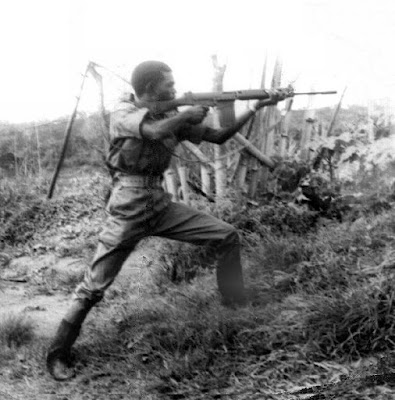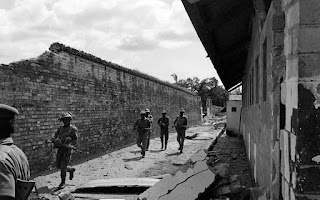Asaba Massacre: Monument As Balm For War Trauma
By all accounts, it was not a case of unfortunate collateral damage of war nor was the killing fields anywhere near the theatre of war. It was a premeditated and carefully planned murder. For the people of Asaba, October 7, 1967 is a day that lives in infamy. It was the day federal troops gruesomely slaughtered hundreds of their men and young men in one of the saddest chapters of Nigeria’s history and the first time mass killings of peaceful civilians were carried out in post-independence Africa.
What came to be known universally as the Asaba massacre actually began a few days earlier on October 5, 1967 after Biafran forces were beaten back from their failed venture to capture Lagos at the onset of the civil war. Having been stopped on their tracks at Ore and a fast retreat ensued, federal forces entered Asaba on October 5 and launched series of deadly raids on homes to fish out and summarily execute any adult male they felt collaborated with the Biafran forces who had earlier invaded Asaba en route the march to Ore. It was an indiscriminate and wanton assassination of innocent people in a town with a common linguistic affinity with the Igbos of Biafra.
In a bid to stem the killings and douse the tension in the town, Asaba elders decided to demonstrate their allegiance to a united Nigeria and mobilised their people to welcome the federal troops gaily clad in their treasured akwa ocha, the traditional hand woven fabric associated with the Anioma people in today’s Delta State. Having gathered in their hundreds in the town’s main square of Ogbeosowa for what they envisaged to be a ceremonial welcoming party for the men and officers of Second Division of the Nigerian Army, the federal troops separated the women and children from the adult males and young men. There and then, with the express command of their commanders, soldiers from the Second Division mowed down hundreds of the men in full view of the women and children.
The killings continued days after as soldiers hunted the few men that escaped the initial killings in their homes. By the time a measure of restraint came, over 1,000 men had been murdered in cold blood. There were no men to undertake the burial of the dead and it was up to the women who traditionally were barred from handling corpses that had to bury the dead.
For many years after the war ended, the Nigerian government opted to shield the killing from the public knowledge. It was as if it never happened.
- Advertisement -
“Till today, no proper explanation of this event has been provided by the Federal Government neither has any official apology been offered for this humanitarian crime,” Ogbueshi Chuck Nduka-Eze, Isama Amie of Asaba and chairman of the Asaba Massacre Memorial Anniversary Committee, said.
“It remains the only massacre in the world of this magnitude to be treated with silence and impunity. Asaba people have continued to cry out for an explanation for what happened to their people and continue fittingly to remember them and to remind the country about the failure of upholding the principle that all Nigerian lives matter,” he said at the ceremony to mark the 54th anniversary of the event on October 9 and 10, in Asaba.
Nduka-Eze is now leading the effort to build a fitting memorial monument for the massacre. It is a project he can relate to. His mother, Mrs. Rose Eziunor Nduka-Eze, a British-trained nurse, was killed on the same day of the massacre, October 7, 1967 by soldiers, the only woman killed in the actual massacre. As a medical personnel and advocate against injustice, she could not bear to see soldiers brutalising and killing her people. She felt obliged to remonstrate with the soldiers to cease from their dastardly act but was instantly shot dead.
The royal father of Asaba, Asagba Prof. Chike Edozien, called on the Federal Government to initiate steps for the country to come to terms with the killings. Speaking on behalf of his people, the royal father regretted that after 54 years, the Nigerian government still maintains the official policy of ignoring the massacre. Calling for restitution, Asagba Edozien urged on the Federal Government to establish a university in the capital city as part of measures to compensate for the genocide committed against them during the Nigerian civil war. The request, he said, was a modest one to cushion the people from both the emotional and psychological trauma they suffered from the October 7, 1967 massacre.
Endorsing the building of the memorial monument, Ibrahim Pam, who spoke from South Korea, said it is “an important accountability project that would bring to the public consciousness a truthful recollection of this tragedy. It would honour the memory of the dead, safeguard their solemn remembrance and assuage collective trauma and grievance.” Noting that national reconciliation will be promoted through the memorial, Pam whose father, Lt. Col. James Pam, was killed during the 1966 military coup, said “the culture of impunity and lack of accountability built on the amnesia of the Asaba Massacre and other such mass crimes have spawned a terrible legacy of tragic events. Indeed, today, the continued corporate existence of our country is threatened by violent agitations and armed conflicts triggered to some extent by unresolved historical abuses and the absence of effective justice mechanism to hold perpetrators accountable and to deliver justice to victims.”
At the 50th anniversary lecture of the killings in 2017, Nobel Laureate, Prof. Wole Soyinka, said “it is immoral to expect a people to pretend part of their history did not happen” and pointedly asked “where is the restitution”? He said “Asaba massacre was a crime against humanity and there should be recompense then Nigeria can move on.”
Similarly, Bishop Matthew Hassan Kukah, also at the 50th anniversary advocated that perpetrators of the killings make peace with families of the victims, noting that “healing cannot happen until perpetrators confront their victims.”
The Memorial Monument project remains an initiative of some prominent Asaba indigenes led by Ogbueshi Chuck Nduka-Eze. Members of the committee include Ogbueshi Chike Ogeah, a former Delta State Commissioner for Information; Chief Ben Okonta, Prof Victor Izegbu, Ogbueshi Ken Odogwu, Ms Ngozi Edozien and Ogbueshi Uche Nwanze.
Nduka-Eze acknowledges that the task is herculean, but vowed that with the decision of Asaba people to forgive even when the Nigerian government has failed to apologise, “Asaba people will continue to hope till hope creates from its own wreck, the thing it contemplates.”
-------------------THE NATION




Comments